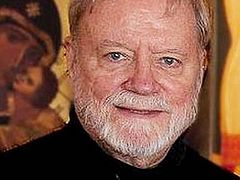Source: Preachers Institute
December 20, 2015

Let us make man in Our Image, suggested He-Who-Is. We are under no constraint to do so, obviously, but We will do it anyway. It will be an exercise in freedom.
The entire enterprise would be rather pointless, moreover, unless We give man the capacity for freedom. Man’s attainment of freedom, then, will be the object of Our act.
We run something of a risk here. Man, not knowing all things, may be tempted to confuse his capacity for freedom with freedom itself. He may start to imagine that freedom consists in the mere ability to make choices. If so, he will divorce freedom from intentional goodness. Our own freedom with respect to man, after all—of which man’s freedom will be an image—is not a choice simply for the sake of a choice. It is, rather, a freedom to love, and we freely make man in order to love him and to teach him to love.
Indeed, continued the Wisdom-from-on-high, we make man in such a way that he can know himself to be the object of Our love. We will endow him with a heart, an intuitive and impulsive principle that will find no rest except in the discovery of this love. And, in the service of this heart, man must have an intellect capable of reflective thought. This means we must also confer on man the ability to speak, because he will not be able to think except with words.
We will not make man exactly like the angels. Them, too, We endowed with freedom, and each of them has already made a choice for or against Our love. Because the angels are pure spirits, that choice happened very fast; it was made in an instant, an irreducible moment, in the very likeness of eternity.
We will do it differently this time. We will make man in such a way that We will “grow” on him. We will reveal Ourself to him, not all at once, but bit-by-bit. This will require making time, the experience of sequence and memory, an essential component of his existence. As We diffused our eternal love to the angels in an instant, we will share that love with man through the duration of a lengthy process—well, at least it will seem lengthy to man.
Thus, man will learn Our love through a completely new thing, which he will call “history.” He will need to control his experience of history by the measurement of time. (This really will be new. There has never been any “time” before.) He will call his measurement of time “chronology.” Chronology will be one of the most important components of his consciousness and thought. Without it, man’s mind will sink into a lethargic state, a nirvana he may confuse with eternity.
In man’s existence things will “happen.” There will be “events” as well as sequence. Indeed, We will make certain events to be the medium of the revelation of Our love for man. A combination of sequence and events will form a revelatory pattern, from which man’s language and thought will give shape to a narrative.
Our Holy Spirit must inspire and control this narrative, conferring on it an authority over man’s memory, reflection, and moral life. This Spirit-sustained narrative will find structural expression in a body of Writings, through which We will continue to speak to the human heart from age to age.
But perhaps We are getting ahead of Ourself. This process must start with first and basic steps. Since events happening in time will be the medium of Our revelation, We will begin by doing something to draw man’s attention to the sequential quality of time. We will construct his world in such a way that he will be encouraged to observe the passage of time, to record its phases, to measure its comings and goings, and to reflect on both its structure and its relationship to his thought.
We will start this with a plan so simple We wonder why We never considered it before. We will place man’s life on a spinning ball, located at some distance from two light sources (throwing in millions of stars by way of wild, improbable embellishment). As the ball spins, half of it will be illumined by the shining of the greater light source. Half the ball, at any one time, will be in relative darkness, half in light. To relieve man’s potential boredom with life on a spinning ball, We will wobble it a bit, to give seasonal variations. Man will count and record these transitions, and those measurements will provide the basic components of the chronology required to structure his narrative of history.
Let’s see, We calculate six days will be enough to complete this arrangement.



